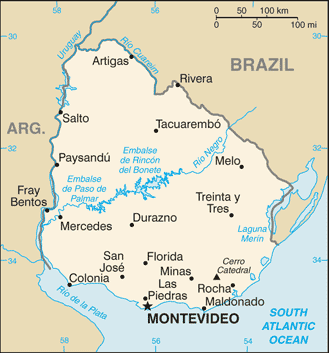 Uruguay's government announced Oct. 1 the granting of licenses to two companies to grow cannabis for commercial distribution. Juan Andrés Roballo, head of the National Drug Board, said the two companies chosen out of 22 applicants were Symbiosys and Iccorp, both start-ups financed by Uruguayan and foreign capital. They will each be allowed to produce two metric tons of cannabis yearly—with the plantations to be guarded by government troops. Uruguayans will be able to purchase 10 grams (about a third of an ounce) weekly. Roballo told reporters that cannabis will go on sale in the country's pharmacies "in no less than eight months from now."
Uruguay's government announced Oct. 1 the granting of licenses to two companies to grow cannabis for commercial distribution. Juan Andrés Roballo, head of the National Drug Board, said the two companies chosen out of 22 applicants were Symbiosys and Iccorp, both start-ups financed by Uruguayan and foreign capital. They will each be allowed to produce two metric tons of cannabis yearly—with the plantations to be guarded by government troops. Uruguayans will be able to purchase 10 grams (about a third of an ounce) weekly. Roballo told reporters that cannabis will go on sale in the country's pharmacies "in no less than eight months from now."
The move has been a long time coming. In May 2014 Uruguay's cabinet set a six-month deadline for pharmacy sales. But as November came, regulators backed off setting a firm date because of the country's elections, which returned the leftist Frente Amplio (Broad Front) to power. Conservative challengers who campaigned against the legalization policy were soundly rejected by Uruguay's voters.
The legalization law, signed by then-President José "Pepe" Mujica in December 2013, allows each household to register to grow up to six plants, and citizens can also unite in cannabis clubs to grow a collective 40 plants. So far some 3,000 have registered to grow at home, and some 10 "grow clubs" have been formed, with names like the 420 Cannabis Club.* The new program will see the first legal commerical sales in South America. (Reuters, Oct. 2; EFE, Oct. 1; InSight Crime, Sept. 25; InfoBae, Argentina, Aug. 10; The Guardian, July 13; DPA, May 3, 2014; El Comercio, Peru, March 28, 2014)
* Note: See erratum below
Cross-post to High Times
Graphic: Perry-Castañeda Library Map Collection







Comments
Media errors on Uruguay cannabis program?
We were just contacted by Laura Blanco of the Asociación de Estudios del Cannabis del Uruguay, who informs us that the cannabis clubs can actually grow 99 plants and distribute 40 grams each month to up to 45 members. There are 20 registered cannabis clubs in the country, with some 60 more awaiting approval.